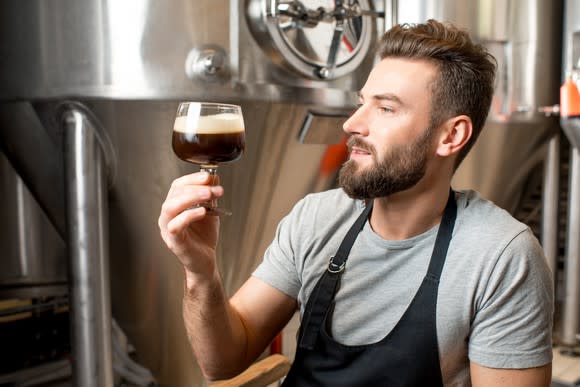Is Craft Beer Still Worth Investing In?
Off-premise sales of craft beer inched higher in 2018, with the overall volume of craft beer sold rising 1.2% through Dec. 2, according to data from market research firm IRI. The year-over-year increase really isn't surprising since there are more than 7,000 breweries operating in the U.S. today, more than at any time in history and 10% greater than the number in business in 2017.
Yet despite more breweries churning out more beer, the gains are fairly anemic and call into question whether investors should even bother looking at the sector anymore. The industry looks poised to head into decline even though another 1,000 breweries are expected to open this year.

Investing in craft beer requires looking more closely at which beer is winning. Image source: Getty Images.
On the precipice of decline
Craft beer's slowdown has been well-documented as drinkers have turned to whiskey, wine, and other alcoholic beverages. There may even come a time when Boston Beer (NYSE: SAM) brews more hard cider, tea, and seltzer than it does its flagship Samuel Adams brand, as beer drinkers continue favoring local microbreweries over more mass-produced beer.
That helps explain the explosive growth in the number of breweries that continue to open each year, but the saturation is also causing fewer brewers to become breakout successes.
While the dollar amount of craft beer sold off-premise rose in 2018 by 1.7%, it was higher prices driving this growth as volume was down 0.4%. Off-premise sales are those made at packaged goods store and other convenience outlets like supermarkets, mass merchandisers, warehouse clubs, and drugstores.
Craft beer overall saw better pricing from switching over to 15-pack packaging, which helped overall dollar sales rise 2.5% for the period, but it couldn't help the industry's biggest brands sell more of their brew. Volume sales for 17 of the 30 best-selling craft brands were down through the beginning of December, with Samuel Adams' Boston lager tumbling 14%, Leinenkugel's seasonal beer falling 13%, and Blue Moon from Molson Coors' (NYSE: TAP) MillerCoors division off 4.7%. Even worse was New Belgium Brewing, which saw a 19.5% plunge in its flagship Fat Tire brand.
Well-heeled winners
Yet not every craft beer saw falling sales. In fact, some brands are soaring, among them Cigar City Brewing's Jai Alai IPA, which saw volumes surge 71% in the year through Dec. 2; a near-32% increase for Big Wave from Craft Brew Alliance's (NASDAQ: BREW) Kona Brewing; and a 21% gain by Firestone Walker Brewing's American-style blonde ale 805.
Even Anheuser-Busch InBev (NYSE: BUD) had a big hit, as its Elysian Brewing saw volumes soar 68%, an indication the macro brewer's strategy of buying up a dozen craft brewers wasn't a complete swing and a miss.
This all suggests there is still opportunity in craft beer, though investors need to carefully choose their spots. Shares of Craft Brew Alliance, for example, lost 25% of their value last year, but Kona Brewing has been a huge success for it and could be what saves the brewer. Its stock is up almost 8% so far in 2019.
It also means it's good to have deep-pocketed backers. A-B InBev not only invested in distribution for its Elysian Brewing brewery, but it owns a third of Craft Brew Alliance and has helped Kona through its national distribution network. Similarly, Cigar City Brewing is owned by CANarchy Craft Brewer Collective, which is backed by private equity firm Fireman Capital, and Firestone Walker is owned by Duvel Moortgat, the second-largest brewer in Belgium behind InBev.
It may be that true craft brewers as defined by the Brewers Association can no longer effectively compete against mass craft beer, and the co-opting of the name that was feared has come true. That means investors will need to look at the craft-y names from megabrewers if they want to find a craft beer worth their money.
More From The Motley Fool
Rich Duprey has no position in any of the stocks mentioned. The Motley Fool owns shares of and recommends Boston Beer. The Motley Fool owns shares of Molson Coors Brewing. The Motley Fool recommends Anheuser-Busch InBev NV. The Motley Fool has a disclosure policy.

 Yahoo Finance
Yahoo Finance 